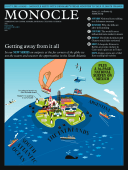
Issue 21
Getting away from it all: In our new series on outposts at the far corners of the globe we test the waters and uncover the opportunities in the South Atlantic.
In This Issue
Oops! No content was found.
Looks like we no longer have content for the page you're on. Perhaps try a search?
Return Home

